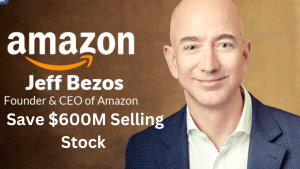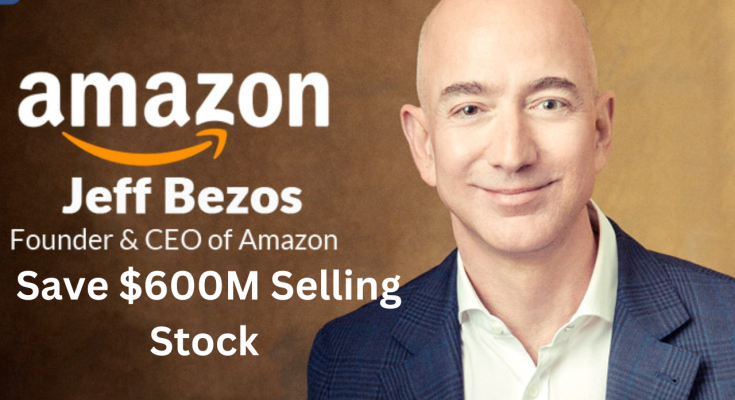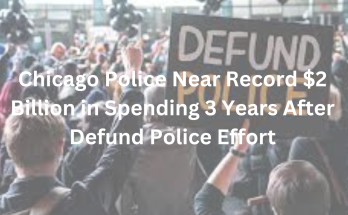Introduction to Amazon CEO Jeff Bezos to Save $600M Selling Stock
In a significant financial move, Amazon CEO Jeff Bezos has announced plans to sell a considerable amount of stock, potentially saving him $600 million in taxes. This decision has garnered widespread attention and sparked discussions about tax policies, wealth distribution, and the role of billionaires in society. In this article, we’ll delve into the details of Bezos’ stock sale, its implications, and the broader context surrounding it.
Amazon CEO Jeff Bezos Wealth and Tax Strategy:
As one of the wealthiest individuals globally, Jeff Bezos’ financial decisions often make headlines. With a substantial portion of his wealth tied up in Amazon stock, any move to sell shares attracts scrutiny. Amazon CEO Jeff Bezos decision to sell stock in Florida, a state with no personal income tax, is strategic from a tax perspective, potentially saving him hundreds of millions of dollars.
Jeff Bezos’ financial decisions financial decisions often attract scrutiny and speculation, given his status as one of the wealthiest individuals on the planet. By capitalizing on Florida’s tax-friendly environment, Bezos stands to save hundreds of millions of dollars in taxes that he would have incurred if he sold the stock in a state with higher tax rates. This decision underscores the importance of tax planning and geographic arbitrage for high-net-worth individuals.

Read More Article : Amazon CEO Jeff Bezos to Save $600M Selling Stock
Understanding the Stock Sale:
Amazon CEO Jeff Bezos plan to sell Amazon stock comes as part of a prearranged trading plan known as a 10b5-1 plan. These plans allow company insiders to sell a predetermined number of shares at predetermined times, providing a level of transparency and reducing the risk of insider trading allegations.
By utilizing this approach, Amazon CEO Jeff Bezos aims to diversify his investment portfolio while minimizing tax liabilities.. By adhering to this structured approach, Bezos aims to diversify his investment portfolio while mitigating potential market perception issues associated with large-scale stock sales.
Implications for Amazon and its Shareholders:
While Amazon CEO Jeff Bezos stock sale may have personal financial implications, it is unlikely to directly impact Amazon’s operations or stock performance. However, large-scale sales by company insiders can sometimes signal shifts in confidence or strategy, which investors may interpret in various ways.
Additionally, the influx of shares into the market could influence Amazon’s stock price in the short term. However, the influx of shares into the market could affect Amazon’s stock price in the short term, potentially influencing investor sentiment and market dynamics. Shareholders will closely monitor the situation, but the long-term trajectory of Amazon’s business remains the primary determinant of its stock performance.
Broader Context and Tax Policy:
Bezos’ decision to sell stock in Florida highlights the significant role that tax policies play in the financial decisions of high-net-worth individuals. With some states imposing higher income and capital gains taxes than others, wealthy individuals often seek to minimize their tax liabilities through strategic planning and geographic arbitrage.
This dynamic has sparked debates about income inequality, tax fairness, and the need for comprehensive tax reform. With some states imposing higher income and capital gains taxes than others, wealthy individuals often seek to optimize their tax liabilities through strategic planning and geographical considerations. This dynamic has reignited debates about income inequality, tax fairness, and the need for comprehensive tax reform to address systemic issues
Criticism and Public Perception:
While Amazon CEO Jeff Bezos stock sale is entirely legal and within his rights as a shareholder, it has nevertheless drawn criticism from some quarters. Critics argue that billionaires like Amazon CEO Jeff Bezos should pay their fair share of taxes, especially in light of growing wealth inequality and societal challenges. The optics of Amazon CEO Jeff Bezos decision to sell stock while many Americans struggle economically have also fueled public debate about corporate responsibility and social justice.
Conclusion:
Amazon CEO Jeff Bezos plan to sell Amazon stock in Florida represents a significant financial move with potential implications for his personal wealth and tax liabilities. While the decision is entirely legal and within Amazon CEO Jeff Bezos rights as a shareholder, it has sparked discussions about tax policies, wealth distribution, and the responsibilities of the ultra-wealthy. As debates continue to unfold, Amazon CEO Jeff Bezos stock sale serves as a reminder of the complex intersection between wealth, taxation, and societal values.
Read More Article: Explore Truth: Facts About Death Penalty in South Carolina




